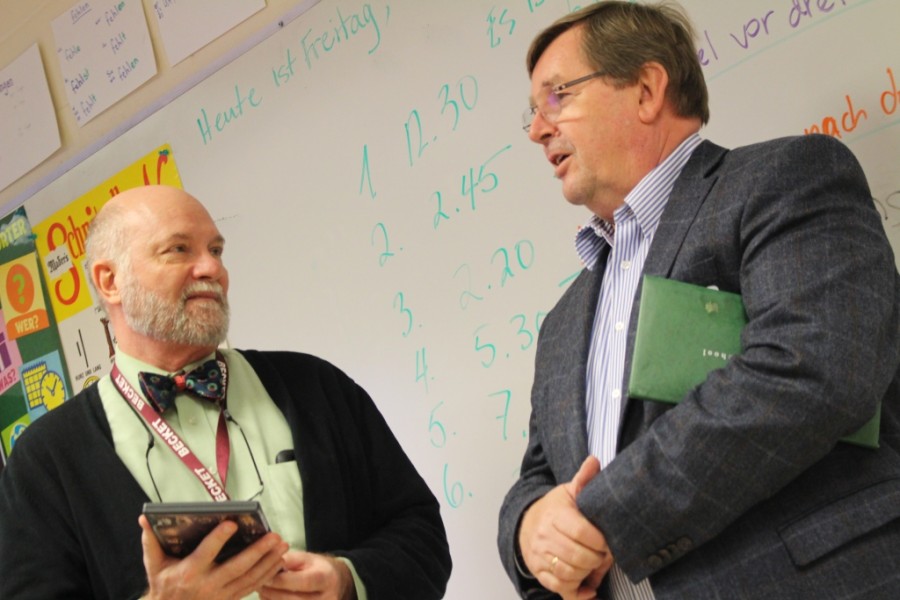Class of 1965 Exchange Student Returns to Alma Mater
Trinity German teacher Mr. John Youngblood and Mr. Gerhard Grainer, an exchange student from Austria who was a member of the Class of 1965
December 5, 2014
Mr. Gerhard Grainer, a native of Vienna, Austria, and a 1965 Trinity graduate, returned to his alma mater Dec. 5, nearly 50 years after having left the United States.
As a young man around 18, Grainer was selected as part of a five-student foreign exchange program through the National Catholic Welfare Conference. This conference brought students to the US for one year of high school learning. Through this process, Grainer was able to select the type of family he was going to reside with while in the US.
Musical attributes were what he sought; he had been a Vienna Choir Boy, having traveled all around the world performing and was at the time playing the piano. He ended up being hosted by Bob and Carolyn Ising; Bob was a conductor and musician.
Grainer’s visit was arranged by Mr. Paul Ising, a nephew of Bob and Carolyn. Grainer was accompanied by his brother, a former banker. Trinity teacher Mr. Wayne Kraus, Ising’s cousin, was also instrumental in coordinating the visit.
“That was the reason why I came to Louisville, Kentucky, and lived with this family,” said Grainer, who received a scholarship to attend Trinity for one year. “I was mainly in senior classes, but I had one class in junior year which was American history because American history is nothing that is taught in Austria.”
After graduating in ’65, Grainer returned to his homeland and was surprised by just how significant his time in the US was. He said that the five youngsters who were selected for the exchange program met at the end of the year and flew home to Austria; they did nothing but talk in English the whole way home. He said, “When you start thinking in a language, it begins to run.”
Recalling an interesting conversation with neighbors, Grainer said, “When I came home one year later, my neighbors wanted to know how it was.” While speaking to them, Grainer said, “they started looking peculiarly at me — I was mixing English and German.”
After returning to Austria, Grainer landed a job with IBM, with whom he worked for more than 40 years, retiring as an executive. He now owns an opera company in Vienna.
Grainer returned to the US to spend a day on Trinity’s campus — something that has certainly changed since the ’60s. During the day he spent two class periods with German teacher Mr. John Youngblood. The first class he spoke to was a 30-minute session, during which students asked questions about learning languages, differences between Europe/Austria and the US, and how Trinity has changed since his high school days.
When he first came to the United States, Grainer knew some English. “My father was translating many languages for his company (the largest steel manufacturer in Austria). He taught me and my brother at home some English.”
Being with an American family and having American classmates and buddies, he noted, really helped him learn the language through immersion. Having spoken German all his life, he did run into some pronunciation problems. “There is a difference in speaking; there is a difference in language. When I graduated in Austria, I had an oral test, and I still remember one question that I was asked: ‘Can you tell me the difference between ‘leutnant’ (German for lieutenant) and how would the English population say to that?’ It was ‘leftenant.’”
Students were curious to hear Grainer’s point of view when comparing the States and Europe.
“I would say one thing I found out long after I was here was in Europe everyone is learning one additional language.” He went on to say that in every school in Austria, everyone learns English.
In regards to differing cultures, Grainer said, “America is a very big country. America is different. If you change Kentucky to Georgia, it is about the same. In Europe it is difficult, even with the European Union.”
Looking at the growth of Trinity’s campus, Grainer, who took a tour with Foundation Director of Major Gifts Tim Culver, first pointed out the changes in entrances to the school. “You have a lot of new buildings now; you have a great stadium in the back,” Grainer said. He spoke about the auditorium and the communication arts center buildings not being a part of the campus back in his day.
Among other things back in his high school days, Grainer said, “The biggest competitor was St. X.” Youngblood’s students agreed with that one.
Grainer then asked how many students Trinity could support (1,400-1,600), and he said that in his day it was about 600 to 700. He also noted that about 70 to 80 percent of the faculty were priests in his day.
Closing out the class period, Grainer gave the class this piece of advice: “Try to have the chance to go into another country. Try to find out if it is a useful experience. I can tell you it is. All my kids have been outside of Austria, at least for a year, to stay there, to learn, to know the difference of mentalities, the difference of characters, the difference of being just another statesman — and this is something that really gives you a lot of additional information for your future. So if you have the chance, do it, wherever.”


